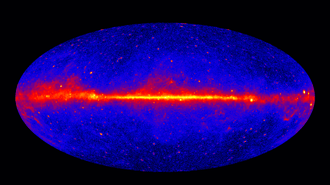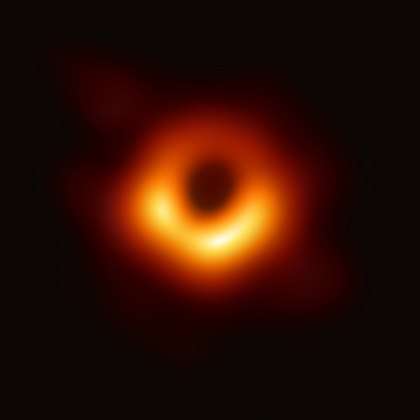Galactic Center GeV Excess
The Galactic Center GeV Excess (GCE) is an unexpected surplus of gamma-ray radiation in the center of the Milky Way galaxy that is unexplained by direct observation.[1] As of 2020, this excessive (and diffused) gamma-ray radiation is not well understood by astronomers.[2][3][4][5] However, astronomers have suggested that self-annihilating dark matter may be a dominant contributor to the GCE, based on analysis using non-Poissonian template fitting (NPTF) statistical methods[3], wavelet methods[5], and studies by other astronomers may support this idea.[6][7] Other hypotheses include ties to an unseen population of millisecond pulsars[8] or young pulsars, burst events, the stellar population of the galactic bulge,[9] or the Milky Way's central supermassive black hole.[10]

Two percent of the gamma ray radiation in a 30° radius circle around the galactic center is attributed to the GCE. While some controversially argue that it might be radiation from dark matter (which is not otherwise known to radiate) or another exotic explanation, some still believe that conventional objects such as pulsars could explain the GCE.[1]
See also
- Galactic Center – Rotational center of the Milky Way galaxy
- Gamma-ray astronomy – Observational astronomy performed with gamma rays
References
- Cho, Adrian (12 November 2019). "Physicists revive hunt for dark matter in the heart of the Milky Way". Science | AAAS. Retrieved 31 March 2020.
- Starr, Michelle (30 April 2019). "Something's Glowing at The Heart of Our Galaxy, But It May Not Be What We Thought". ScienceAlert.com. Retrieved 30 April 2019.
- Leane, Rebecca K. & Slatyer, Tracy R. (17 April 2019). "Dark Matter Strikes Back at the Galactic Center". Phys. Rev. Lett. 123 (24): 241101. arXiv:1904.08430v1. doi:10.1103/PhysRevLett.123.241101. PMID 31922851.
- Fadelli, Ingrid (14 July 2020). "Could recently spotted dim point sources explain the galactic center excess (GCE)?". Phys.org. Retrieved 14 July 2020.
- Zhong, Yi-Ming; McDermott, Samuel D.; Cholis, Ilias & Fox, Patrick J. (27 November 2019). "Testing the Sensitivity of the Galactic Center Excess to the Point Source Mask". Phys. Rev. Lett. 124 (23): 231103. arXiv:1911.12369. Bibcode:2020PhRvL.124w1103Z. doi:10.1103/PhysRevLett.124.231103.
- Cuoco, Alessandro; et al. (4 March 2019). "Scrutinizing the evidence for dark matter in cosmic-ray antiprotons". Physical Review D. 99 (10): 103014. arXiv:1903.01472v1. Bibcode:2019PhRvD..99j3014C. doi:10.1103/PhysRevD.99.103014.
- Cholis, Ilias; et al. (6 March 2019). "A Robust Excess in the Cosmic-Ray Antiproton Spectrum: Implications for Annihilating Dark Matter". Physical Review D. 99 (10): 103026. arXiv:1903.02549v1. Bibcode:2019PhRvD..99j3026C. doi:10.1103/PhysRevD.99.103026.
- Bartels, Richard; et al. (February 2016). "Strong Support for the Millisecond Pulsar Origin of the Galactic Center GeV Excess". Physical Review Letters. 116 (5). 051102. arXiv:1506.05104. Bibcode:2016PhRvL.116e1102B. doi:10.1103/PhysRevLett.116.051102. PMID 26894696.
- Macias, Oscar; et al. (12 March 2018). "Galactic bulge preferred over dark matter for the Galactic centre gamma-ray excess". Nature Astronomy. 2 (5): 387–392. arXiv:1611.06644. Bibcode:2018NatAs...2..387M. doi:10.1038/s41550-018-0414-3.
- Hooper, Dan & Goodenough, Lisa (21 March 2011). "Dark matter annihilation in the Galactic Center as seen by the Fermi Gamma Ray Space Telescope". Physics Letters B. 697 (5): 412–428. arXiv:1010.2752. Bibcode:2011PhLB..697..412H. doi:10.1016/j.physletb.2011.02.029.
Further reading
- Ackermann, M.; et al. (May 2017). "The Fermi Galactic Center GeV Excess and Implications for Dark Matter". The Astrophysical Journal. 840 (1). 43. arXiv:1704.03910. Bibcode:2017ApJ...840...43A. doi:10.3847/1538-4357/aa6cab.
- Shang, Liangliang; et al. (May 2018). "Interpretations of galactic center gamma-ray excess confronting the PandaX-II constraints on dark matter-neutron spin-dependent scatterings in the NMSSM". European Physical Journal C. 78 (5). 390. arXiv:1804.08797. Bibcode:2018EPJC...78..390S. doi:10.1140/epjc/s10052-018-5827-8.

